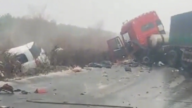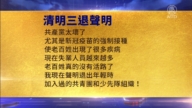【新唐人2012年11月24日讯】《外交学者》杂志网站的一篇文章,预言中国未来10年,很可能遭遇重大经济政治危机,甚至卷入军事冲突,文章说,当年苏联突然解体,曾让美国政府和中情局措手不及,为避免意外,他们应多了解中国存在的政治斗争、经济增长减缓、与周边国家领土争端升级、环境灾难、缺乏政改新思想等问题。文章说,中国如果出现意想不到的经济崩溃或严重的政治危机,更别说是军事冲突,到底影响会如何,这应该成为各国战略规划的一部分。
《外交学者》11月21号刊登“要为中共垮台做好准备(Planning for China’s ‘Fall’)”文章,作者Michael Auslin是美国首府华盛顿特区美国企业研究所的学者。
文章指出,越来越多的中国问题观察家已经发出警报,中国很多方面都陷入危机。作者列出清单,提醒全世界政府和政策分析家们,应该注意的事情。
第一、中共高层分裂和丑闻。作者表示,薄熙来案件透露了中南海内的权斗和中共高层的惊人腐败。
第二、是经济增长放缓。中国经济在今年(2012年)显着放缓。据报导,2010年,中国全国各地发生了180,000起抗议和起义事件,疲弱的经济无疑将给中国的社会和政治体系带来严重压力。由于中国面临地方债务危机,大城市房地产市场越来越泡沫化,作者认为,地方债务和房地产泡沫化这两者只要有一个崩溃,就可能对经济增长带来数不清的后果。同时,一胎化政策的恶果开始显现,他说,本世纪中国将面临严重的人口挑战,劳动力的萎缩,在未来数年将拖累经济增长。
旅美中国民运人士蔡桂华:“经济状态是什么,物价奇高,收入和消费是不均等的,所以 在这种情况下,老百姓根本没钱,你要拉动内需市场消费,根本就拉动不起来。”
《新唐人》特约经济评论家杰森‧马:“如果这个(经济增长)缓慢开始下降了,一下降人民就受不了,另外地方财政,现在就是靠这种高速增长带来的财政,养着地方官员的奢侈,一旦增长不够了,那么官员一方面收入不够,官员可能彻底出现疲滞,这个团体就垮了,人心就散了。”
另外,无法解决的领土纠纷,是Michael Auslin提出的第三个中国面临的危机。他表示,领土纠纷时间越长、越与民族主义示威相关,意外事件就越可能引发实际的冲突。虽然很难想像围绕这些岛屿会发生全面战争的爆发,可是,即使是轻微的武装冲突,所引发的政治和经济负面后果,也足以让人担忧。
本周举行的亚太峰会,就受到中国与其他国家的主权争端影响,东南亚国家就如何应对中国不断增强的主权立场,没有达成一致。根据《金融时报》最近报导,中国在新版护照上印了包括南中国海在内的中国地图,加强了主权立场,此举激怒了和中国有主权争端的邻国。
《外交学者》的文章还提出,“正在形成的环境灾难”,和“没有推动改革的迹象”,都将成为中国社会动荡的根源。
文章最后说,如果中国在世界舞台上越来越弱,军中将如何应对?如果经济增长继续放缓,或债务负担增加,未来几年金融危机困扰中国,领导层会不会分裂?对这些问题,西方或亚洲政府应该密切关注。
作者表示,如果北京当局出现任何权力中断、变弱或崩溃,都将对全世界产生深远的影响。
采访/朱智善 编辑/黄亿美 后制/郭敬
Diplomacy Scholars: Preparing for China’s Fall
An article on the Diplomacy Scholars website predicted
that in the next 10 years, China is likely to face a significant
economic and political crisis, or even become involved
in a military conflict.
The article stated that the Soviet Union’s sudden disintegration
caught the U.S. government and the CIA off guard.
In order to avoid accidents, they could educate themselves
regarding the political struggle in China, economic slowdown,
increasing territorial disputes with neighboring countries,
environmental disasters, and the lack of new political reform ideas.
The article said that what kind of effects from China’s
unexpected economic collapse or serious political crisis,
let alone a military conflict should become part
of the national strategic planning.
Diplomacy Scholars published Preparing for China’s Fall
on November 21.
Its author, Michael Auslin, is a scholar
of the American Enterprise Institute in Washington, DC.
The article pointed out that more and more China observers
have issued an alert on the many aspects of China’s crisis.
The authors provided a list of issues that global governments
and policy analysts should pay attention to.
The first is divisions and scandals at the high level CCP.
The author believes that the Bo Xilai case revealed the power
struggle within Zhongnanhai and shocking corruption at the high level.
The second is the economic slowdown.
China’s economy slowed significantly this year (2012).
It has been reported that in 2010, there were 180,000 protests
and uprisings all over the country.
The weak economy undoubtedly put serious pressure
on China’s social and political system.
As China faces local debt crises and real estate market
collapses in major cities, the authors argued that
either local debt or a real estate crash will bring
untold consequences to economic growth.
Meanwhile, the bad consequences of the one-child policy
are starting to show.
He added, in this century, China will face serious
demographic challenges,
and the shrinking labor force will be a drag on
economic growth in the next few years.
American pro-democracy activists Cai Guihua: “Under
the current economic status –extraordinarily high prices
and income and consumption inequality, people simply
have no money.
If you want to stimulate domestic demand market
consumption, you will fail.”
Jason Ma, NTDTV’s special economic critic: “If the economic
growth begins to decline, people cannot handle it.
In addition, local revenues rely on this high-speed growth
to support the luxury of local officials.
When growth is lacking, the officials do not have
enough income.
Thus, officials may appear to be tired and this group
would collapse."
Michael Auslin pointed out that the third crisis China faces
is the irresolvable territorial disputes.
He said that the longer the territorial disputes, the more
nationalist demonstrations related accidents will occur.
Although it is difficult to imagine the outbreak of full-scale
war surrounding these disputes,
even a minor armed conflict could trigger worrisome
negative political and economic consequences.
The Asia-Pacific summit held this week was affected by
the sovereignty of China and other countries.
Southeast Asian countries have not reached an agreement
on how to deal with China’s growing sovereign stance.
Financial Times in the UK reported that recently the new
version of the passport from China, which includes
the South China Sea as its territory to strengthen
its sovereignty stance, has angered China’s neighbors.
In the article, Michael Auslin also suggested that
“environmental disasters" and “no signs to promote reform”
will become a source of social unrest in China.
At the end of the article: If China is getting weaker
on the world stage, how will the military handle it?
If economic growth continues to slow, the debt increases,
or there’s a financial crisis in the next few years, will the leadership level then split?
Both western and Asian governments should pay
close attention to these problems.
The authors said that if the Beijing authorities exhibit
any power interruption, weakening or collapse, it will have a profound impact on the world.

























